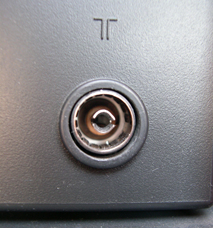Belling-Lee connector
 Male (left) and female Belling-Lee connectors | |||
| Type | RF coaxial connector | ||
|---|---|---|---|
| Production history | |||
| Designer | Belling & Lee Ltd in Enfield, United Kingdom | ||
| Designed | Around 1922 (Belling-Lee) | ||
| Cable | Coaxial | ||

The Belling-Lee connector (also type 9,52, but largely only in the context of its specification, IEC 61169, Part 2: Radio-frequency coaxial connector of type 9,52)[1] is commonly used in Europe, parts of Southeast Asia, and Australia, to connect coaxial cables with each other and with terrestrial VHF/UHF roof antennas, antenna signal amplifiers, CATV distribution equipment, TV sets, and FM and DAB radio receivers. In these countries, it is known colloquially as an aerial connector, IEC connector, PAL connector, or simply as a TV aerial connector. It is one of the oldest coaxial connectors still commonly used in consumer devices.[citation needed] For television signals, the convention is that the source has a male connector and the receptor has a female connector. For FM radio signals, the convention is that the source has a female connector and the receptor has a male connector. This is more or less universally adopted with TV signals, while it is not uncommon for FM radio receivers to deviate from this, especially FM radio receivers from companies not based in the areas that use this kind of connector.
It was invented at Belling & Lee Ltd in Enfield, United Kingdom[a] around 1922 at the time of the first BBC broadcasts. Originally intended for use only at MF frequencies (up to 1.6 MHz) when adopted for television they were used for frequencies as high as 957 MHz. Belling Lee Limited still exists as a wholly owned subsidiary of Dialight, since 1992.[2]
In type 9,52, the 9,52, in French SI style, refers to the 9.525-millimetre (3⁄8-inch) male external and female internal connector body diameter.
In their most common form the connectors just slide together. There is, however, also a screw-coupled variant which is specified to have an M14×1 thread.[1]

There is also a miniature Belling-Lee connector which was used for internal connections inside some equipment (including BBC RC5/3 Band II receiver and the STC AF101 Radio Telephone). The miniature version is only about 4.4-millimetre (3⁄16-inch) in diameter.
See also
[edit]References
[edit]- ^ a b "IEC 61169-2:2007". www.iec.ch. International Electrotechnical Commission. Retrieved 4 November 2020. Radio-frequency connectors – Part 2: Sectional specification – Radio frequency coaxial connectors of type 9,52".
- ^ dialight.com: Dialight plc. Annual Report and Accounts 2016 (paper-page 115, pdf-page 117), backup
- ^ The Belling-Lee company was also known for its 4-millimetre (5⁄32-inch) low-voltage plugs and sockets (similar to banana connectors but much shorter, with transverse leaf-spring contacts), also fuse-, indicator lamp-, and battery holders
